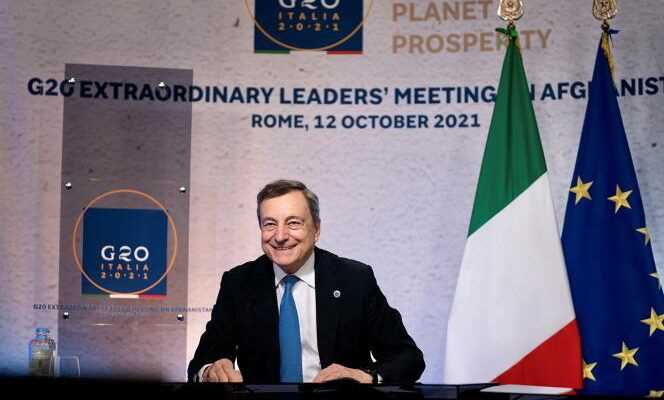Help Afghanistan without helping the Taliban. This is the challenge to which the leaders of the G20 countries, meeting at a distance two months after the precipitous withdrawal of American forces and the victory of the Islamist movement, tried to respond to Tuesday, October 12. Sign of growing tensions about the attitude to adopt vis-à-vis the new regime, Xi Jinping and Vladimir Poutin declined the invitation launched a few days ago by Mario Draghi, the president of the Italian council, at the head of the G20 this year. Joe Biden and Emmanuel Macron, however, responded present.
China and Russia, represented at ministerial level on Tuesday, seek to stabilize the country as quickly as possible, even if it means reaching out to the new authorities. Conversely, Westerners do not want to recognize Taliban power. They condition the thaw of their development aid on respect for human rights, those of Afghan women and girls in particular, as well as on the severing of links between former insurgents and terrorist organizations, such as Al-Qaida.
“Confronting the humanitarian crisis supposes contacts with the Taliban but that does not mean their recognition”, Mario Draghi
To avoid the pitfalls, Mario Draghi has mainly sought to respond to the humanitarian crisis that threatens the country. This is the urgency of the moment as 600,000 people are displaced, after years of conflict, and winter is approaching. It is also the most consensual subject between the forces present: the European countries and the United States support the establishment of emergency aid, through the United Nations, likely to be channeled to populations, unconditionally and unimpeded. For German Chancellor Angela Merkel, it is out of the question that the international community “Remains to watch without reacting while 40 million people plunge into chaos for lack of electricity and a financial system” viable.
“Confronting the humanitarian crisis supposes contacts with the Taliban but that does not mean their recognition”, insisted Mario Draghi, after the videoconference meeting. The Italian leader invited Qatar, which has become an essential intermediary between the West and the new masters of Kabul, in particular to continue the evacuations of foreigners or threatened Afghan civilians. Turkey and Saudi Arabia also participated in the tour de table, but not Pakistan, sponsor of the Taliban and not a member of the G20.
For the rest, deep differences complicate any common approach in order to stabilize the country and prevent it from becoming a terrorist sanctuary again. “Both Russia and China have clearly had the will to engage the Taliban from the start: they still have their embassy in Kabul, like nine other states”, we see in the entourage of Emmanuel Macron.
You have 57.8% of this article to read. The rest is for subscribers only.
